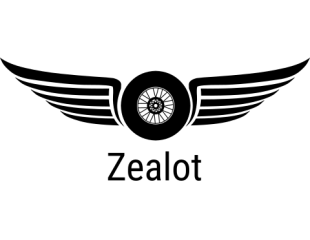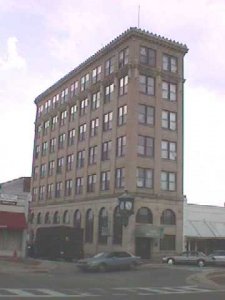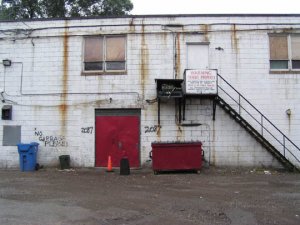Seen any good structures to Model anywhere
- Thread starter interurban
- Start date
You are using an out of date browser. It may not display this or other websites correctly.
You should upgrade or use an alternative browser.
You should upgrade or use an alternative browser.
Papa Bear said:When you're serious about getting rid of bugs...
Love it Papa, some say we need bugs,, I say time to cull the beggers :thumb:

Actually the Restaurant is in the background, the nursery is under the wings. At one time the Bomber was on top of a gas station which would interesting to model 
http://www.thebomber.com/restaurant.asp
http://www.thebomber.com/restaurant.asp
That Funky Woodwork
Its called gingerbread and is linked to the victorian style. It was often seen on balloon type house construction which was big back in the day.
Its called gingerbread and is linked to the victorian style. It was often seen on balloon type house construction which was big back in the day.
Round barn?
Round Barns I have seen around fruit orchards. One also fis the home of a murder mystery series: The Cat Who.., I am a font of usless information.
Round Barns I have seen around fruit orchards. One also fis the home of a murder mystery series: The Cat Who.., I am a font of usless information.
A barn similar to the one in the link, but with a more shallow roof, I think, has been rescued from a farm near West Lorne, Ontario and is being re-erected by a landscaping compeny in or near the village of Muirkirk, also in Ontario.
<a href="http://timelinks.merlin.mb.ca/imagere2/ref0976.htm">octagonal barn</a>
<a href="http://timelinks.merlin.mb.ca/imagere2/ref0976.htm">octagonal barn</a>
Sounds like the same thing, there is a barn in Vermont being restored as well according to my brother in law, he used to travel abit. in New England for work.
There are some excellent photos of barns and other buildings along with the signs from links you will find off a Google search for "Mail Pouch" "Ceresota Fllour" etc.
Jerry
Jerry
I have been shooting lots of the local early 20th Century brick buildings around town. Mostly for folks who are in a rut painting their DPM building kits.
http://www.mellowmike.com/Buildings/Thumbnails_19.html
I skip the ones that have had recent facelifts. These are all present day (2004) variety. It's interesting to note how windows are either bricked in - or have plywood covering them from inside - when no longer in use.
Other times, brickwork is painted over. Sometimes just on the sides - other times all over. You can also see the variety of brick colors in use, and the sooty weathering. Plus, when a building is razed for a parking lot, the remaining buildings have the remnants still visible.
http://www.mellowmike.com/Buildings/Thumbnails_19.html
I skip the ones that have had recent facelifts. These are all present day (2004) variety. It's interesting to note how windows are either bricked in - or have plywood covering them from inside - when no longer in use.
Other times, brickwork is painted over. Sometimes just on the sides - other times all over. You can also see the variety of brick colors in use, and the sooty weathering. Plus, when a building is razed for a parking lot, the remaining buildings have the remnants still visible.
Mike, thank you very much for these fine photographs - they are great eye-openers for all of us who stumble through a wealth of details and never see them.
For me as an European it is always a bit strange to see how the electric power lines are led into the buildings in the USA. There still seem to be lots of (pardon the expression ) caveman installations around. Here in central Europe the whole power disribution is underground and today you hardly ever see a household power line or telephone pole. Of course we had these lines some decades back, too. But because we have 220 Volts instead of your 110 Volts the wires were much thinner and not as conspicuous as the thick cables in America.
) caveman installations around. Here in central Europe the whole power disribution is underground and today you hardly ever see a household power line or telephone pole. Of course we had these lines some decades back, too. But because we have 220 Volts instead of your 110 Volts the wires were much thinner and not as conspicuous as the thick cables in America.
But it's just photographs like yours which helps us European modellers of American prototype to get that bit of reality which we would simply forget otherwise. So thank you for these fine pics!
And, BTW, congratulations to the quality of your other photographs on your website! Again, lots of details to see there - you gave me a wealth of suggestions to do some more detailing. No wonder I bookmarked your site!
Ron
For me as an European it is always a bit strange to see how the electric power lines are led into the buildings in the USA. There still seem to be lots of (pardon the expression
But it's just photographs like yours which helps us European modellers of American prototype to get that bit of reality which we would simply forget otherwise. So thank you for these fine pics!
And, BTW, congratulations to the quality of your other photographs on your website! Again, lots of details to see there - you gave me a wealth of suggestions to do some more detailing. No wonder I bookmarked your site!
Ron





